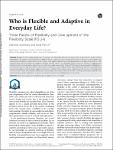Who is Flexible and Adaptive in Everyday Life?
| dc.contributor.author | Vylobkova, V | |
| dc.contributor.author | Heintz, S | |
| dc.date.accessioned | 2023-10-12T16:55:28Z | |
| dc.date.available | 2023-10-12T16:55:28Z | |
| dc.date.issued | 2023-07-01 | |
| dc.identifier.issn | 2698-1866 | |
| dc.identifier.issn | 2698-1866 | |
| dc.identifier.uri | https://pearl.plymouth.ac.uk/handle/10026.1/21408 | |
| dc.description.abstract |
Background: How flexible people react to changes, and adapt their behavior and plans, seems to be crucial in modern society. Nevertheless, no common conceptualization of flexibility exists in the psychological literature. Our work contributes to the scientific understanding of flexibility as a personality trait and offers a novel flexibility questionnaire. Methods and Results: An explorative study ( N = 279) examined three individual-difference concepts of flexibility and their relations with the Big Five personality traits. The results suggested that flexibility consists of predictability, adaptability, and orderliness can be assessed with 24 items (FS-24) and is distinguishable from the Big Five. A confirmatory study ( N = 188) replicated the three flexibility components and showed good test–retest reliability for the FS-24. Convergent and discriminant validity of the instruments need further scrutiny. Limitations: The present study is limited due to self-reports, and the specificity and size of the sample, which could be addressed in future studies. Conclusions: The FS-24 showed promising psychometric properties. The questionnaire has useful applications in personality research, organizational development, and counseling. | |
| dc.format.extent | 195-206 | |
| dc.language | en | |
| dc.publisher | Hogrefe Publishing Group | |
| dc.subject | 5205 Social and Personality Psychology | |
| dc.subject | 52 Psychology | |
| dc.subject | Behavioral and Social Science | |
| dc.subject | Neurosciences | |
| dc.title | Who is Flexible and Adaptive in Everyday Life? | |
| dc.type | journal-article | |
| dc.type | Journal Article | |
| plymouth.issue | 1 | |
| plymouth.volume | 4 | |
| plymouth.publisher-url | http://dx.doi.org/10.1027/2698-1866/a000047 | |
| plymouth.publication-status | Published | |
| plymouth.journal | Psychological Test Adaptation and Development | |
| dc.identifier.doi | 10.1027/2698-1866/a000047 | |
| plymouth.organisational-group | |Plymouth | |
| plymouth.organisational-group | |Plymouth|Research Groups | |
| plymouth.organisational-group | |Plymouth|Faculty of Health | |
| plymouth.organisational-group | |Plymouth|Faculty of Health|School of Psychology | |
| plymouth.organisational-group | |Plymouth|REF 2021 Researchers by UoA | |
| plymouth.organisational-group | |Plymouth|Users by role | |
| plymouth.organisational-group | |Plymouth|Users by role|Academics | |
| plymouth.organisational-group | |Plymouth|REF 2021 Researchers by UoA|UoA04 Psychology, Psychiatry and Neuroscience | |
| plymouth.organisational-group | |Plymouth|REF 2021 Researchers by UoA|UoA04 Psychology, Psychiatry and Neuroscience|UoA04 Psychology, Psychiatry and Neuroscience MANUAL | |
| plymouth.organisational-group | |Plymouth|Research Groups|Plymouth Institute of Health and Care Research (PIHR) | |
| dcterms.dateAccepted | 2023-06-01 | |
| dc.date.updated | 2023-10-12T16:55:28Z | |
| dc.rights.embargodate | 2023-10-13 | |
| dc.identifier.eissn | 2698-1866 | |
| dc.rights.embargoperiod | forever | |
| rioxxterms.versionofrecord | 10.1027/2698-1866/a000047 |


